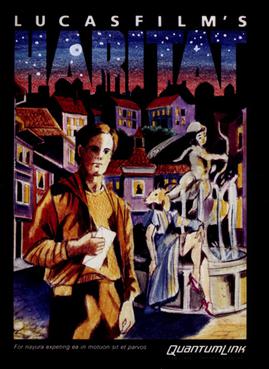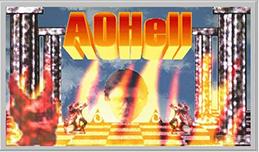
AOL is an American web portal and online service provider based in New York City, and a brand marketed by Yahoo! Inc.

AIM was an instant messaging and presence computer program created by AOL, which used the proprietary OSCAR instant messaging protocol and the TOC protocol to allow registered users to communicate in real time.

A bulletin board system (BBS), also called a computer bulletin board service (CBBS), is a computer server running software that allowed users to connect to the system using a terminal program. Once logged in, the user could perform functions such as uploading and downloading software and data, reading news and bulletins, and exchanging messages with other users through public message boards and sometimes via direct chatting. In the early 1980s, message networks such as FidoNet were developed to provide services such as NetMail, which is similar to internet-based email.

The term chat room, or chatroom, is primarily used to describe any form of synchronous conferencing, occasionally even asynchronous conferencing. The term can thus mean any technology, ranging from real-time online chat and online interaction with strangers to fully immersive graphical social environments.

Instant messaging (IM) technology is a type of synchronous computer-mediated communication involving the immediate (real-time) transmission of messages between two or more parties over the Internet or another computer network. Originally involving simple text message exchanges, modern IM applications and services tend to also feature the exchange of multimedia, emojis, file transfer, VoIP, and video chat capabilities.

CompuServe, Inc. was an American online service, the first major commercial one in the world. It opened in 1969 as a timesharing and remote access service marketed to corporations. After a successful 1979 venture selling otherwise under-utilized after-hours time to Radio Shack customers, the system was opened to the public, roughly the same time as The Source.

Stephen McConnell Case is an American businessman, investor, and philanthropist best known as the former chief executive officer and chairman of America Online (AOL). Case joined AOL's predecessor company, Quantum Computer Services, as a marketing vice-president in 1985, became CEO of the company in 1991, and, at the height of the dot-com bubble in 2000, orchestrated with Gerald M. Levin the merger that created AOL Time Warner, described as "the biggest train wreck in the history of corporate America."
An online service provider (OSP) can, for example, be an Internet service provider, an email provider, a news provider (press), an entertainment provider, a search engine, an e-commerce site, an online banking site, a health site, an official government site, social media, a wiki, or a Usenet newsgroup.

Prodigy Communications Corporation was an online service from 1984 to 2001 that offered its subscribers access to a broad range of networked services. It was one of the major internet service providers of the 1990s.
AppleLink was the name of both Apple Computer's online service for its dealers, third-party developers, and users, and the client software used to access it. Prior to the commercialization of the Internet, AppleLink was a popular service for Mac and Apple IIGS users. The service was offered from about 1986 to 1994 to various groups, before being superseded by their short-lived eWorld and finally today's multiple Apple websites.

eWorld was an online service operated by Apple Inc. between June 1994 and March 1996. The services included email, news, software installs and a bulletin board system. Users of eWorld were often referred to as "ePeople."

Gmail is the email service provided by Google. As of 2019, it had 1.5 billion active users worldwide, making it the largest email service in the world. It also provides a webmail interface, accessible through a web browser, and is also accessible through the official mobile application. Google also supports the use of third-party email clients via the POP and IMAP protocols.

Habitat is a massively multiplayer online role-playing game (MMORPG) developed by LucasArts. It is the first attempt at a large-scale commercial virtual community that was graphic based. Initially created in 1985 by Randy Farmer, Chip Morningstar, Aric Wilmunder and Janet Hunter, the game was made available as a beta test in 1986 by Quantum Link, an online service for the Commodore 64 computer and the corporate progenitor to AOL. Both Farmer and Morningstar were given a First Penguin Award at the 2001 Game Developers Choice Awards for their innovative work on Habitat. As a graphical MUD it is considered a forerunner of modern MMORPGs unlike other online communities of the time. Habitat had a GUI and large user base of consumer-oriented users, and those elements in particular have made Habitat a much-cited project and acknowledged benchmark for the design of today's online communities that incorporate accelerated 3D computer graphics and immersive elements into their environments.

AOHell was a Windows application that was used to simplify 'cracking' using AOL. The program contained a very early use of the term phishing. It was created by a teenager under the pseudonym Da Chronic, whose expressed motivation was anger that child abuse took place on AOL without being curtailed by AOL administrators.
The AOL Community Leader Program or AOL CLP was the official name for the large group of America Online online service volunteers who moderated chat rooms, message boards, and download libraries.
Tracy Reed is an American writer who created the first episodic online story, the QuantumLink Serial on AOL.
PlayNet was an American online service for Commodore 64 personal computers that operated from 1984 to 1987. It was operated by the PlayNet, Inc of Troy, New York.
Google Workspace is a collection of cloud computing, productivity and collaboration tools, software and products developed and marketed by Google. It consists of Gmail, Contacts, Calendar, Meet and Chat for communication; Drive for storage; and the Google Docs Editors suite for content creation. An Admin Panel is provided for managing users and services. Depending on edition Google Workspace may also include the digital interactive whiteboard Jamboard and an option to purchase add-ons such as the telephony service Voice.
MobileMe is a discontinued subscription-based collection of online services and software offered by Apple Inc. All services were gradually transitioned to and eventually replaced by the free iCloud, and MobileMe ceased on June 30, 2012, with transfers to iCloud being available until July 31, 2012, or data being available for download until that date, when the site finally closed completely. On that date all data was deleted, and email addresses of accounts not transferred to iCloud were marked as unused.
Started in 1983, Boston CitiNet was a local online service developed by Applied Videotex Systems, Inc. of Belmont, Massachusetts. The service allowed modem-equipped personal computer users to dial-in and access a range of information and messaging services including chat, forums, email and a variety of content. There were several other companies offering paid/subscription services as the time like The Source, CompuServe and Boston-based Delphi. Boston Citinet was unique since it was free to access and was supported by advertising. Messaging services such as email and chat required registration and a monthly fee of $9.95 - an early example of the now popular freemium business model.











